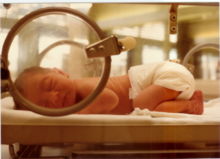
Early onset of allergic rhinitis (AR) is poorly described, and rhinitis symptoms are often attributed to infections.
In this French study, data on AR-like symptoms (runny nose, blocked nose, sneezing apart from a cold) were collected using a questionnaire administered during the health examination at age 18 months included in the follow-up of the PARIS birth cohort.
Prevalence of AR-like symptoms in the past year was 9.1% of the 1850 toddlers of the study cohort. AR-like symptoms and dry cough apart from a cold were frequent comorbid conditions.
Parental history of AR in both parents increased the risk of suffering from AR-like symptoms with an odds ratio (OR) 2.09.
Significant associations were found with the presence of biological markers of atopy, especially blood eosinophilia and sensitization to house dust mite (OR 1.54 and OR 2.91). There was no relation with sensitization to food.
These results support the hypothesis that AR could begin as early as 18 months of life.
Suspicion of AR should be reinforced in infants with:
- parental history of AR
- biological evidence of atopy - blood eosinophilia and sensitization to inhalant allergens
References:
Does allergic rhinitis exist in infancy? Findings from the PARIS birth cohort. Herr M, Clarisse B, Nikasinovic L, Foucault C, Le Marec AM, Giordanella JP, Just J, Momas I. Allergy. 2010 Aug 30.
Allergies May Start in Baby's First Month http://goo.gl/5e6Gg and http://goo.gl/tg039
Doctors are to expose babies to dust mites in an attempt to halt the rising allergy epidemic http://goo.gl/kr2E7 - Not likely to work.
Doctors are to expose babies to dust mites in an attempt to halt the rising allergy epidemic http://goo.gl/kr2E7 - Not likely to work.
Image source: Wikipedia, GNU Free Documentation License.
Treatment Options for Allergic Rhinitis (click to enlarge the image).